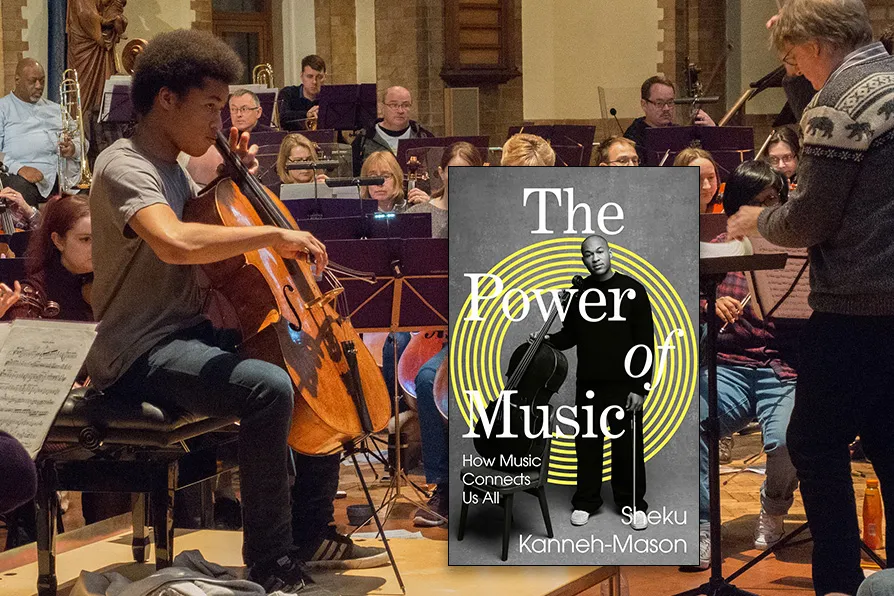ELEANOR DOBSON reflects on a stark visual record of the violent desecration of Tutankhamun’s mummified remains
JONATHAN TAYLOR appreciates how, for a black British musician, to walk onstage can be a rebellious act

 Sheku Kanneh-Mason rehearsing the Elgar Cello Concert with Ealing Symphony Orchestra, 2018 [Pic: Lucy Robinson/Flickr/CC]
Sheku Kanneh-Mason rehearsing the Elgar Cello Concert with Ealing Symphony Orchestra, 2018 [Pic: Lucy Robinson/Flickr/CC]
The Power of Music: How Music Connects Us All
Sheku Kanneh-Mason, Penguin, £16.99
FOLLOWING a successful appearance in 2023’s Last Night of the Proms, celebrated cellist Sheku Kanneh-Mason was asked on Desert Island Discs if he thought “Rule Britannia” should be dropped from the programme. He answered yes, because of its association with imperialism and the transatlantic slave-trade, its jingoistic assertion that “Britons never will be slaves”: they can be slave-holders and slave-traders, apparently, but never slaves.
As Kanneh-Mason suggests, in his new book The Power of Music, the lyrics explicitly exclude whole groups of British people: “If our inclusion meant we should happily boast that we were not people who could be enslaved or subjugated… we were radically not included. For my family, as descendants of slaves, or born in colonies, none of this was distant history.”
Despite such convincing arguments, Kanneh-Mason’s interview on Desert Island Discs was greeted “with an uproarious wave of censure and horror… in the media, and an unguarded uprising of racist bile on social media.” People called for him “to be ‘tagged, flogged and deported,’ to ‘go back home’ and to ‘keep [his] n***er mouth shut.’”
For ethnonationalists like these, Kanneh-Mason writes: “It didn’t matter how I felt, or how non-white people feel. It didn’t matter that we suffered, were excluded or frightened by a nationalism we couldn’t share. If we wanted to stay at the centre and apex of our most prestigious classical music festival… our voices had to be… silenced.”
In this kind of febrile context, Kanneh-Mason argues that “to walk onstage holding a classical instrument… is a rebellious act.” In its own quiet way, The Power of Music is similarly rebellious, as an impassioned and compelling response to what Kanneh-Mason calls “the silencing of our voices.” In place of silence and exclusion, the book makes the case for an all-embracing model of classical music – and music in general – which is accessible to everybody. “My intention,” he writes, “is to break down… perceived boundaries and to widen engagement in classical music among those who now struggle with a feeling of exclusion.”
One of the key means of widening engagement is education, and Kanneh-Mason talks at length about both the importance of music education, and its disastrous erosion due to a short-sighted utilitarian austerity, on the part of successive governments. For Kanneh-Mason, “music education in childhood and in school should be a cornerstone of every child’s life and a universal right,” but, “in a world aggressively devoted to business, profit and computation,” it has been subjected to a “funding squeeze, or complete lack of funding in [state] schools.”
This results in an exclusionary model of education, whereby whole groups – in terms of class, ethnicity, geography and so on – do not have access to musical knowledge or training. “What is already happening,” suggests Kanneh-Mason, “is that music ends up being practised only by those groups in society that are lucky enough to be offered an education in the arts, an education whose value is increasingly… expensive.”
Nonetheless, Kanneh-Mason holds out some hope “that the future of classical music [can be] bright,” and, indeed, increasingly inclusive. The current Master of the King’s Music, Errollyn Wallen, was “the first black woman composer to win [an] Ivor Novello Award.” Likewise, “more music by black and women composers is being heard in concerts with major orchestras.” And, of course, there are the Kanneh-Mason family themselves “who should statistically have been unlikely to become classical musicians” yet who now have “highly successful careers, performing and recording internationally.”
These instances serve as hopeful antidotes to a rigidly monocultural model of classical music – that is, the kind of model implied by the racist response to Kanneh-Mason’s Desert Island Discs interview. “I want to listen to the many voices within classical music that were always there and that still define the landscape,” writes Kanneh-Mason. “If we don’t allow these voices in the room or we silence them when they are there, we risk the dessication of the genre we love.”
We also risk the dessication of the notion of “Britishness” in general. “My place as a British musician,” Kanneh-Mason suggests, “needs always to be claimed and reclaimed along with an unrelenting and unrepentant interrogation of what ‘British’ means.”
“British” musicianship doesn’t have to involve silencing certain voices and histories; there is more to “Britishness” than “Rule Britannia” – something more open, nuanced and inclusive.
Jonathan Taylor is an author, editor, lecturer and critic. His most recent book is A Physical Education: On Bullying, Discipline & Other Lessons (Goldsmiths Press, 2024).

STEVE ANDREW enjoys an account of the many communities that flourished independently of and in resistance to the empires of old

JONATHAN TAYLOR attempts to disentangle the mind, self and political opinions of a successful bourgeois novelist

JONATHAN TAYLOR is intrigued by an account of the struggle of Soviet-era musicians to adapt to the strictures of social realism











